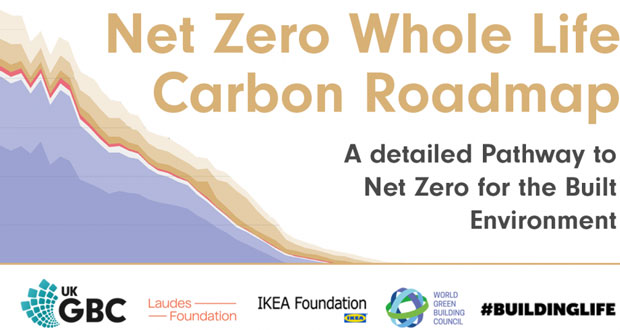The UK Green Building Council (UKGBC) has launched a Net Zero Whole Life Carbon Roadmap for the UK Built Environment (The Roadmap) detailing the necessary actions government and industry must take to achieve net zero across the sector.
The built environment is directly responsible for 25 per cent of the total UK carbon footprint, and therefore has a critical role to play in the national transition to net zero.
Co-created by industry with over 100 organisations contributing, the Roadmap provides a shared vision and set of actions for achieving a net zero UK built environment by 2050, in relation to construction, operation and demolition of buildings and infrastructure.
The Roadmap quantifies, for the first time, the specific emission reductions across sub-sectors of the built environment that will need to take place year-on-year to meet the 2050 deadline. The analysis includes not only domestic emissions, but emissions related to the consumption of imported construction products and materials. The Roadmap establishes a net zero emissions budget and trajectory to 2050, consistent with wider UK carbon targets and budgets as set-out by the Climate Change Committee (CCC), enabling government and the UK built environment to benchmark progress over the coming years and decades.
The Roadmap sets out policy recommendations for central and local governments to help drive and enable the transition needed to decarbonise the sector. These go beyond the recently published UK Government Heat & Buildings strategy and cover existing homes, existing non-domestic buildings and new buildings as well as for the infrastructure which connects our buildings and industry.
The recommendations include:
1) Nation-wide retrofitting of existing homes
- Establish an immediate national programme of “fabric first” home retrofit to make homes efficient, warm, and transition away from fossil fuel heating.
- Bring forward the cut-off date for the sale of gas and oil boilers to 2030.
- Reform EPCs and introduce minimum EPC ratings for homes at point of sale by 2028.
- Remove VAT on energy efficient retrofit building works and introduce variable stamp duty linked to energy performance.
- Introduce direct government retrofit grants for low-income households.
2) Energy performance disclosure for non-domestic buildings
- Introduce mandatory in-use energy disclosure for non-domestic buildings.
- Accelerate the roll-out of energy performance rating schemes across non-domestic sectors, followed by minimum standards and fiscal incentives.
3) Adoption of a design for performance approach to new buildings
- Reform building regulations to introduce Energy Usage Intensity (kWh/m2/yr) targets for new buildings from 2025.Alongside low carbon heating for all new buildings from 2025, introduce space heating demand limits (kWh/m2/yr), measures to limit peak demand, and minimum standards for currently unregulated key appliances.
4) Whole life carbon measurements and agreed limits
- Introduce the regulation of embodied carbon for new buildings and major refurbishments
- Support and invest in industrial decarbonisation of key construction material supply chains
- Use planning reforms to prioritise reuse of existing buildings and assets
5) National infrastructure investment based on the net emissions impact
- Establish a National Infrastructure Integrator with full oversight of carbon impacts
Julie Hirigoyen, Chief Executive at UKGBC said: “After all the talk, it’s time for action.
“The UK Government’s Heat and Buildings Strategy is a step in the right direction but fails to address several key priorities that this analysis clearly demonstrates are non-negotiable to achieving a net-zero carbon built environment by 2050. The Net Zero Whole Life Carbon Roadmap pulls together disparate strands of recent policy and action into one coherent pathway, with clear recommendations for National Government and Local Authorities, as well as the private sector and the wider industry. We urge policy-makers and industry to embed these recommendations into policies and strategies to make good on the promises and commitments of COP26.”
Nigel Topping, COP26 High Level Climate Action Champion, commented: “As we start a critical decade for climate action, the United Kingdom can and should take a leadership role. This report epitomises leadership and establishes that the UK built environment has a comprehensive and rigorous plan for abating its emissions across the construction, operation, and demolition of buildings and infrastructure. I invite you all to use this Roadmap for delivering a net zero future.”
Recruiting for soft FM services is proving more difficult in the post-Covid workplace. So, what can FMs do to overcome this?
Sara Bean, Editor of FMJ, and Jess Pritchard, Head of Corporate Sector at Moneypenny are joined by panellists:
- Mark Whittaker, General Manager, Thomson FM & Chair of IWFM
- Ian Wright, Soft Services Manager, University College London
- David Bauld, Group Facilities Manager, Paradigm Housing
- Nicola Lathbury, Managing Director, Hexagon FM
Together they will discuss the current skills shortage in a number of FM areas, ways to keep staff engaged in their job through brilliant culture, and how outsourcing could be a solution to the recruitment issue. Secure your place now for Thursday, 25th November at 11am.
To register click here.





